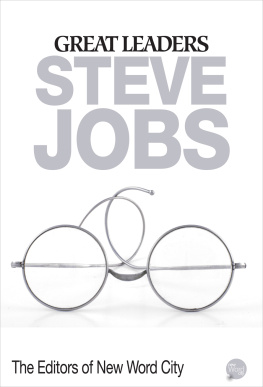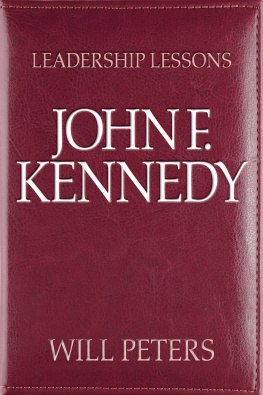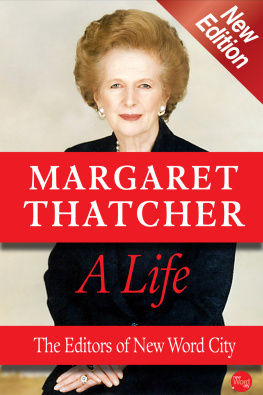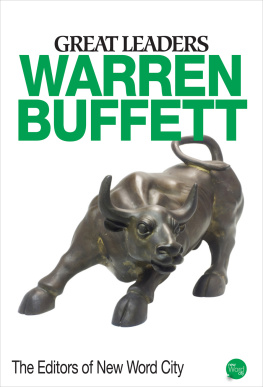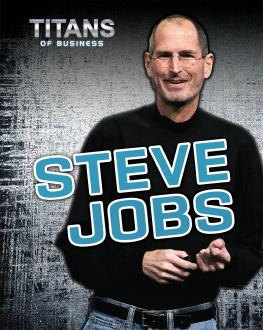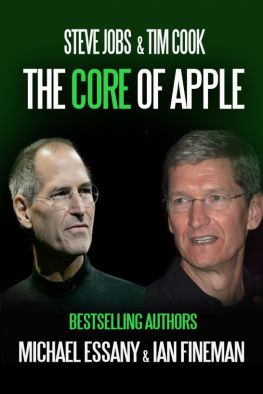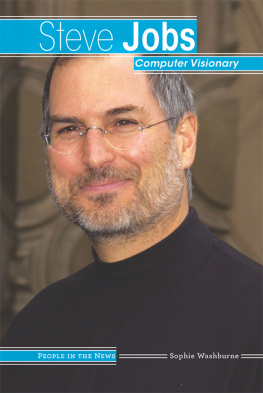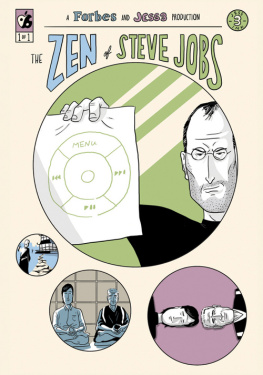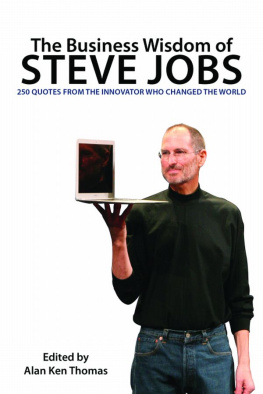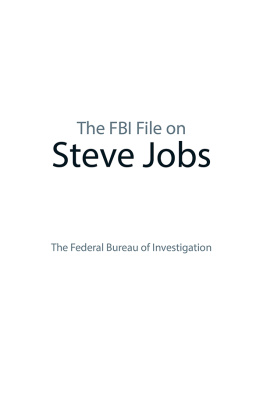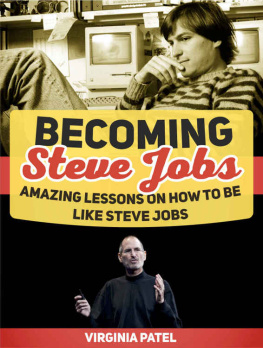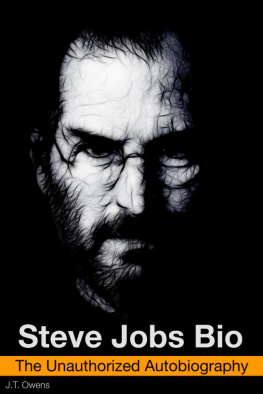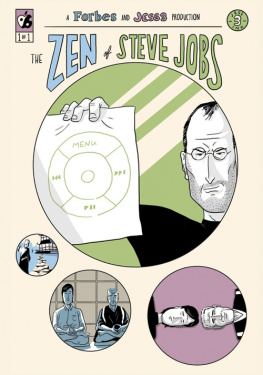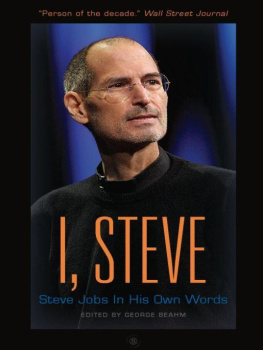Steve Jobs exploded to the front of the room, yelling Stop! This is crazy! He was tired of the whole meeting, tired of mumbling over useless products, tired of trying to find some sort of focus for his aimless company. He grabbed a piece of chalk and stalked to the whiteboard, slashing two lines across it to make four squares. Heres what we need, he said. He wrote two words across the top, Consumer and Pro, and two words down the side, Desktop and Portable. Thats it, he said. Just make four great computers and dont worry about anything else.
The room was frozen into silence. But everyone there knew that, no matter how many afterthoughts might be grafted onto those marching orders, this was the way to go - and anyone who didnt realize that fact had better get out of the way. Even the board of directors would go along without so much as taking a vote. And from that moment on, Steve Jobs was back at Apple Computer. He had been thrown out and exiled for more than ten years, but now he was once again in control. And Apple was going to survive.
It would take a while to save the patient. First Jobs had to finish rooting out the half-baked products cluttering up the place. Then he had to fire or lay off dozens of engineers, technicians, and production people, curing, in his words, Apples infestation of bozos. But in a little over a year, Apple was producing a trickle of profits. About then, Jobs trotted out his latest wonder, the revolutionary iMac computer, a sensuous Technicolor wonder in a ruthlessly beige-box world.
That was Apples ticket to ride into an entirely new world of high-tech living. No one except Steve Jobs understood it then. Most of us still thought that computers were just computers, number-crunchers with communications skills. But a few people got glimmers of the possibilities, and a lot more got a taste of the excitement Apple generated - the sheer pleasure of having a sexy computer and the ease of navigating it. Then, of course, Apple gave us the iPod, and music was everywhere we wanted it. We got the iPhone, and there was more at everyones fingertips than anyone could handle. And we got the iPad, which everybody wanted even though nobody could describe it. We could even begin to hitch our lives together in the cloud.
But we lost Steve Jobs, and no one can imagine what may have gone with him. The one safe thing to say is that the world will never be the same.
Back in 1985, when John Sculley fired Jobs from Apple, it was on the grounds that he was a radical whose vision for his company could never be realized. Apple was supposed to become a wonderful consumer-products company, Sculley wrote later. This was a lunatic plan. High tech could not be designed and sold as a consumer product.
So much for the conventional wisdom of 1985. Eleven years later, with Apple about to crash and burn in pursuit of Sculleys vision, its directors acquired Jobs new business and brought him back to take over his old one - and he set about proving just how wrong Sculley was.
In the process, the inimitable Jobs changed life in the United States and the world over with a set of high-tech devices that no one could have imagined. He shook up entire industries - from music and motion pictures to telecommunications. He made Apple Americas most admired company and raised its market valuation to a stunning $278 billion by the time he died in 2011. And he stood another piece of conventional wisdom on its head, defying the heralded openness of the Internet age to put Apple at the center of a sealed, secretive empire, shaped and controlled by none other than Steve Jobs.
Jobs turnaround of the ailing Apple holds lessons for leaders everywhere.
Change the World
Apples beginnings are the stuff of legend: In 1976, Jobs, a twenty-one-year-old college dropout, and his high-school friend Steve Wozniak set out to raise working capital by selling Jobs Volkswagen minibus and Wozniaks programmable calculator. With that money, they launched Apple, producing and peddling personal computers from the Jobs family garage in Los Altos, California.
By any measure, Steve Jobs was out of the ordinary: the exceptionally smart adopted son of loving parents, a boy with a taste for drugs and mystic religions, a lifelong devotee of bizarre diets, who believed early in life - wrongly - that abstaining from eating meat would make him sweet-smelling without the inconvenience of showering. He resisted authority from the start.
As a boy, Jobs was fascinated by electronics. At twelve, in need of parts, he boldly called up Bill Hewlett, founder of Hewlett-Packard, to discuss a problem with him, and he wound up with a summer job. And he had a direct hand in developing Apple computers. But while he was knowledgeable, he was always Wozniaks second fiddle in the lab - just as Wozniak was happy to have Jobs take the lead in business decisions. Still, Jobs was both a creator and a perfectionist. He had learned from his craftsman father that everything must look good, even the parts that dont show, and he couldnt tolerate sloppy work.
Even at twenty-one, Jobs also had a kind of perfect pitch as an entrepreneur. He knew, for instance - how, nobody knows - that to succeed in business, he would need a publicist. He also recognized his man immediately from a few ads produced for high-tech giant Intel, using illustrations of cars and poker chips instead of charts. So Jobs kept calling Intel until he found out that the ad man was Regis McKenna. Then he kept calling McKenna, never reaching him until he persuaded one of McKennas account executives to come to the computer shop.
Taking one look at the garage, the man decided to spend as little time as possible on this errand. Then the young Jobs came out, barefoot, unkempt, and a bit smelly, and dazzled the executive with how smart he was and how much he knew. A meeting was arranged with McKenna, at which Wozniak insulted him by saying no advertising person would ever be allowed to touch his copy. But after the young men were thrown out, Jobs called again. McKenna went to work for them, and he was still helping out more than thirty years later.
That was no accident. And for all their callowness, the partners clambered up the ladder. Their first computer, the Apple I, was the highlight of the Homebrew Computer Club, where Wozniak would have been perfectly happy to continue sharing his secrets if Jobs hadnt objected. Then Jobs found a computer shop owner who was willing to take fifty machines for $500 apiece, provided the hobby kits could be turned into complete computers with keyboards, circuit boards, software, and a power supply. (The partners didnt quite reach that goal, but the owner paid anyway.) Soon Jobs sold fifty more to friends and another 100 to retailers.
They were finally out of the garage. The Apple II soon followed, with its full complement of parts and its sleek molded case. That called for a $1,500 design from a sophisticated engineer and then for $200,000 in production costs. Raising the money was a struggle, but Jobs recruited a marketer, Mike Markkula, who wrote a business plan and then guaranteed to put up $250,000 for one-third of Apples stock. The Apple II would be the companys primary product for sixteen years, with over 6 million sold. And Markkula was on board for the next twenty years, teaching Jobs about marketing and sales and most of all that the goal of business should never be to get rich, but to turn out good products and create a company that would endure.
Just four years later, with 1,000 employees, Apple went public with the largest initial stock offering since the Ford Motor Company in 1956. After one day of trading, Apple was worth $1.8 billion. Four years after that, the first Macintosh computer introduced consumers to a whole new concept of windows, icons, and the mouse, and Apple had found its niche.
Next page
